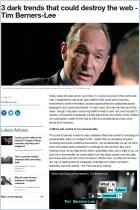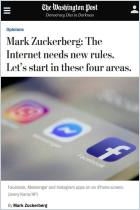
Recommendation
Many consider the internet to be a global public good. Yet increasingly, it is becoming a tool for political manipulation, privacy violations and character assassinations. Tim Berners-Lee, who invented the World Wide Web in the 1990s is on a mission to save the world from a “digital dystopia.” He has worked with more than 80 governmental, private and civil society organizations to put together a set of guidelines for governments, companies and individuals to safeguard the internet. Their actionable recommendations, summed up in the “Contract for the Web,” serve as a primer in internet civics for active web users everywhere.
Summary
About the Author
Tim Berners-Lee is inventor of the World Wide Web, founder of the World Wide Web Foundation and initiator of the “Contract for the Web,” which 80 organizations representing governments, companies and civil society worked on.

















Comment on this summary or 开始讨论